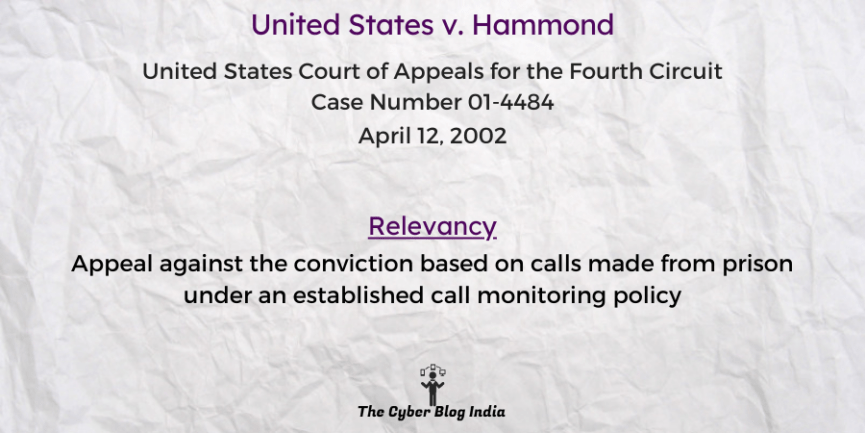United States v. Hammond

United States v. Hammond
286 F.3d 189
In the United States Court of Appeals for the Fourth Circuit
Case Number 01-4484
Before Senior Circuit Judge Hall, Circuit Judge Widener, and Circuit Judge Gregory
Decided on April 12, 2002
Relevancy of the Case: Appeal against the conviction based on calls made from prison under an established call monitoring policy
Statutes and Provisions Involved
- The Omnibus Crime Control and State Streets Act, 18 USC § 2510-2520
Relevant Facts of the Case
- The District Court convicted the defendant of possession of a handgun and sentenced him to imprisonment. The court remanded the case for a suppression hearing to assess the possibility of an unlawful arrest.
- A new witness emerged during the proceedings, corroborating the defendant’s version of history. The District Court issued a subpoena for telephone recordings made by the defendant during his imprisonment.
- The recording of the phone calls inside the prison was a regular occurrence. The authorities informed the prisoners through notices, handbooks, and consent forms.
- Based on these call recordings, the FBI concluded that the defendant coached the witness into providing corroborating testimony.
- The defendant sought suppression of these calls, stating that the government did not comply with the requirements under Title III. However, the District Court rejected this contention, stating that such an act was permissible under “law enforcement” and “consent” exceptions to Title III.
Prominent Arguments by the Counsels
- The defendant’s counsel argued for the exclusion of evidence because the government did not comply with Title III’s requirements. Under Sections 2516 and 2518, the FBI had to obtain a judicial interception order.
Opinion of the Bench
- Both the “law enforcement” and “consent” exceptions would render the recording of the tapes permissible.
- The defendant consented to having his conversations intercepted under Section 2511(2)(c).
- The FBI was free to use the intercepted conversations once they had an exception under Section 2510(5)(a)(1) or 2511(2)(c).
Final Decision
- The Court of Appeals affirmed the District Court’s order.
Kanika Verma, an undergraduate student at Dr. Ram Manohar Lohiya National Law University, prepared this case summary during her association with The Cyber Blog India in January 2023.
